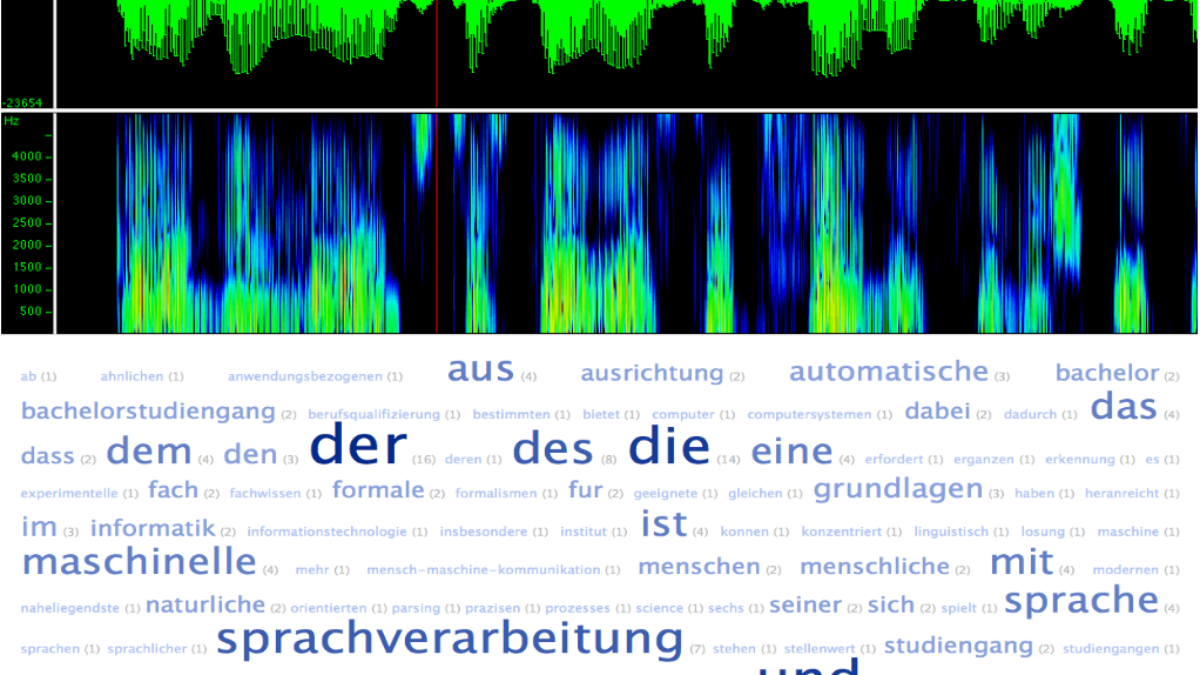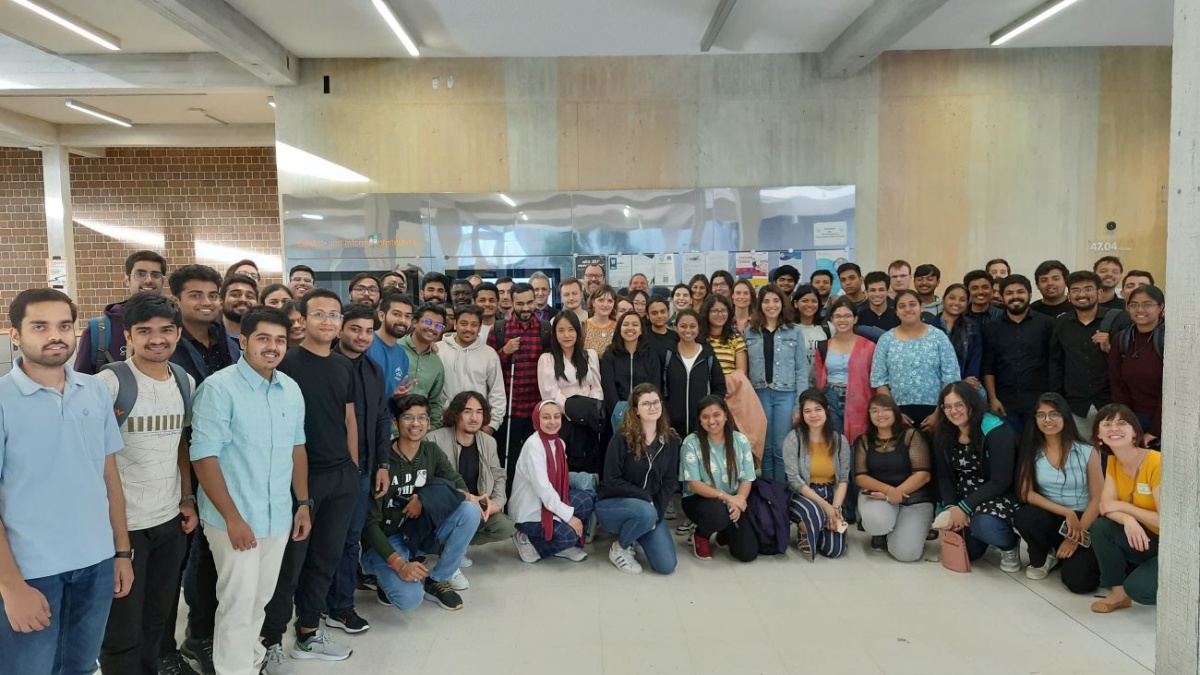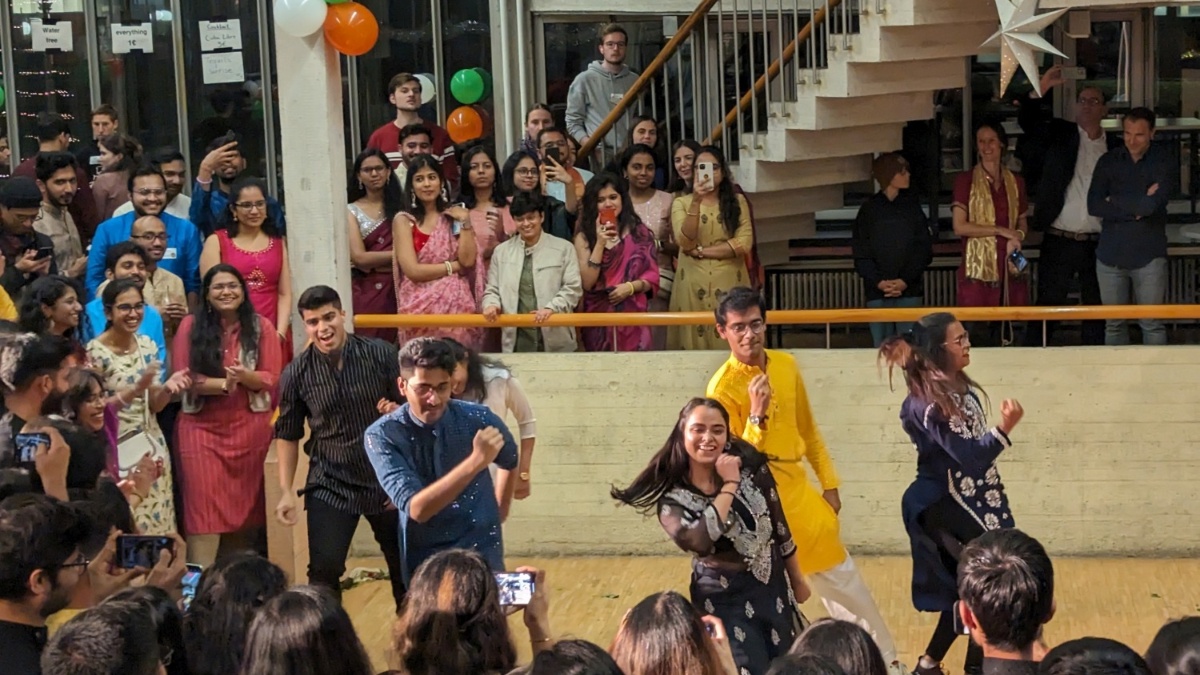In the course of digitization, machine learning continues to gain importance for our society and economy. Thus, technologies for speech recognition and understanding are also increasingly used in numerous areas of life and work. But how do you actually "teach" a computer natural language processing? This is where computational linguistics comes in: it combines expertise in linguistics and computer science, addresses this complex question and develops methods and solutions for our digitized future.
At the University of Stuttgart, students of the M.Sc. Computational Linguistics (CL) receive a highly research-oriented education. The two-year master’s program is offered by the Institute for Natural Language Processing (IMS), a small institute which allows students to work closely with its researchers. Accordingly, the program is characterized by an emphasis on teamwork, laboratory work and research skills. Building on the contents of a B.Sc. in Natural Language Processing (NLP) or a related field, the M.Sc. Computational Linguistics is designed to provide more in-depth skills in specialized subjects in the area of text and speech processing.
- Interest in researching and developing systems and applications, as well as programming
- Logical and abstract thinking
- Excellent language skills/ a linguistically precise and correct expression
- Interest in the complexity of natural languages and their analysis
- Ability to work in a team
The M.Sc. Computational Linguistics is ideal for students with a background in Computer Science and/or Linguistics who want to study in an interdisciplinary, innovative environment.
Students can focus on one of the following areas by choosing specific elective courses:
- Core Computational Linguistics (covering a wide range of theoretical foundations and fundamental technologies for different CL areas)
- Applied Natural Language Processing (covering a wide range of text processing applications and the techniques used to address them)
- Speech Processing (focusing on the automated processing of spoken language for a variety of purposes)
With a master’s degree in Computational Linguistics, our graduates will be prepared for advanced academic or industrial research and development in Computational Linguistics and Natural Language Processing. Thanks to our international orientation and to our connections with the industry, they find employment at renowned institutions and companies in Germany or other parts of the world involved with speech and language technologies.
Typical task areas include speech processing, automatic generation and analysis of texts, machine translation, electronic dictionaries, search technology, (social) media monitoring, or dialogue systems for e.g. (artificially intelligent) robots or chatbots, for smartphones, for cars or for (smart) homes.
Further interesting areas of work contain publishing houses, translation agencies, language teaching (eLearning) or the service and health sector (e.g. BioNLP).
Studying abroad: what opportunities does my study program offer?
In the 3rd semester, students can go abroad and not only broaden their professional expertise, but also their personal horizons. Various partner institutions offer interesting courses in the CL field, which can be credited towards our master’s program Computational Linguistics.
Studying abroad: what opportunities does the University of Stuttgart have to offer?
Are you interested in going on exchange for a semester or two? Or would you rather do some research or attend a language course? Have you ever thought of joining a Summer School or planned an internship abroad? Whatever you have in mind for your exchange, the International Office (IZ) of the University of Stuttgart will help you make your stay abroad an unforgettable experience. The first step will be to sign up online for its information sessions that are offered on a regular basis.
- Studying abroad
Learn more about options for studying abroad on the website of the IZ
Application and admission: how do I get a place at the University?
Admission Requirements
The complete information on the admission process, required knowledge of English, and the criteria for the assessment of professional suitability can be found in the admission regulations, see link below.
English summary:
- Admission requirements: bachelor’s degree (or equivalent) in "Maschinelle Sprachverarbeitung" (Natural Language Processing), Computational Linguistics, Computer Science, General Linguistics or in a closely-related subject; minor in NLP/CL. You can also apply with your current transcript of records if you haven't finished your degree yet.
- In certain cases, interviews will be conducted with the applicants before the decisions can be taken. Students who are missing certain qualifications may be granted admission on the condition that they acquire these qualifications before or during the course of their studies, for example by passing additional modules ("Auflagen" in German). Starting from winter term 2024/25, students with a stronger linguistic background have to pass a specific beginners' programming course in the winter semester.
Language Requirements
For an admission, you need to prove sufficient knowledge of the English language on CEFR level C1 (Common European Framework of Reference for Languages). Please note that you don't need a proof for German language proficiency (since the program is taught in English).
Please find more details in this document:
We strongly recommend students with bachelor’s degrees in subjects other than Computational Linguistics / Natural Language Processing in particular to start their studies in the winter semester.
All applications will be evaluated after the respective deadlines: the results will be announced on the Campus-Management-Portal C@MPUS about 2-3 weeks after the application deadlines have passed.
Application period for the The winter semester starts in October. The summer semester starts in April.
winter semester:
May 15 – July 15
summer semester:
December 1 – January 15
How is the program structured?
- Program structure Computational Linguistics M.Sc. (regulations of 2017)
(Students enrolled in the 2017 version can apply to switch to the new regulations until October 31, 2024. They have been informed about the necessary steps via email.) - Program structure Computational Linguistics M.Sc. (regulations of 2024)
Please note that students with a strong CL background can replace the course "Methods in CompLing" by two advanced seminars. Students concerned will be informed via email after their admission.
The module handbook and the study program curriculum describe the individual modules with the associated courses, content and examinations.
- Curriculum and Module Handbook
Study program structure and detailed module information by clicking on the book symbol
Which institutes are involved in this study program?
The program benefits from a very dynamic environment, as the Institute for Natural Language Processing (IMS) is embedded in the large Department of Computer Science and is closely connected to the renowned Department of Linguistics. With eHumanities being one of the research foci of the University, the M.Sc. Computational Linguistics is ideal for those who want to study in an interdisciplinary, innovative environment.
Important Websites
- FAQ on M.Sc. Computational Linguistics and teaching at the IMS
- International Service Point (ISP) of Faculty 5
Services and information for our international students - Information on fees and charges
An overview of the fees and charges which students of the University of Stuttgart have to pay. - Financial support
- Students representatives
- Information on Master's degrees
Accreditation

Contact for further questions

Stefanie Anstein
Dr.study program manager BSc MSV & MSc CL; student advisor & contact person examination committee BSc MSV, MSc CL & MSc CS
- Profile page
- +49 711 685 81387
- Write e-mail
- Student adviser
International Service Point (ISP) Faculty 5
- Further information
- Write e-mail
- Services and information for our international students









